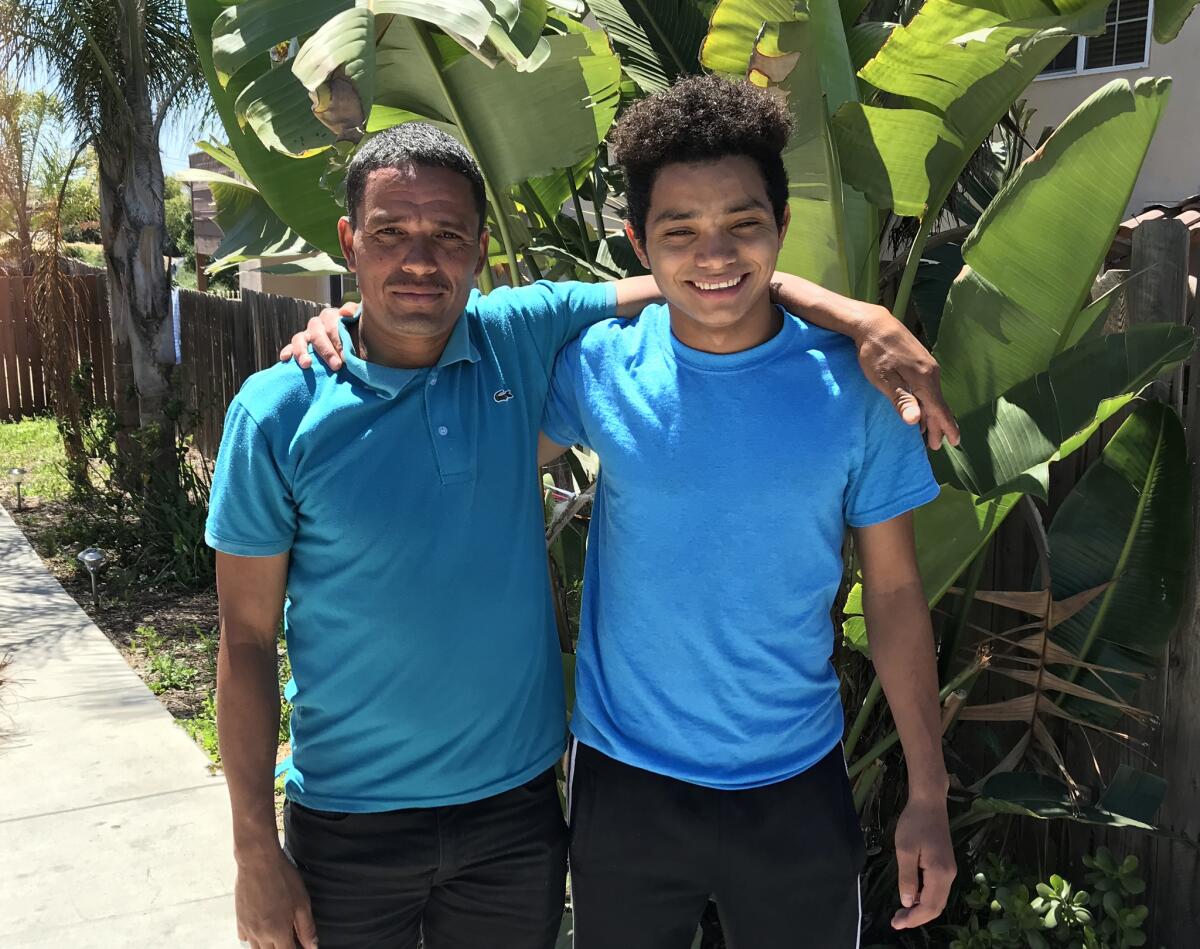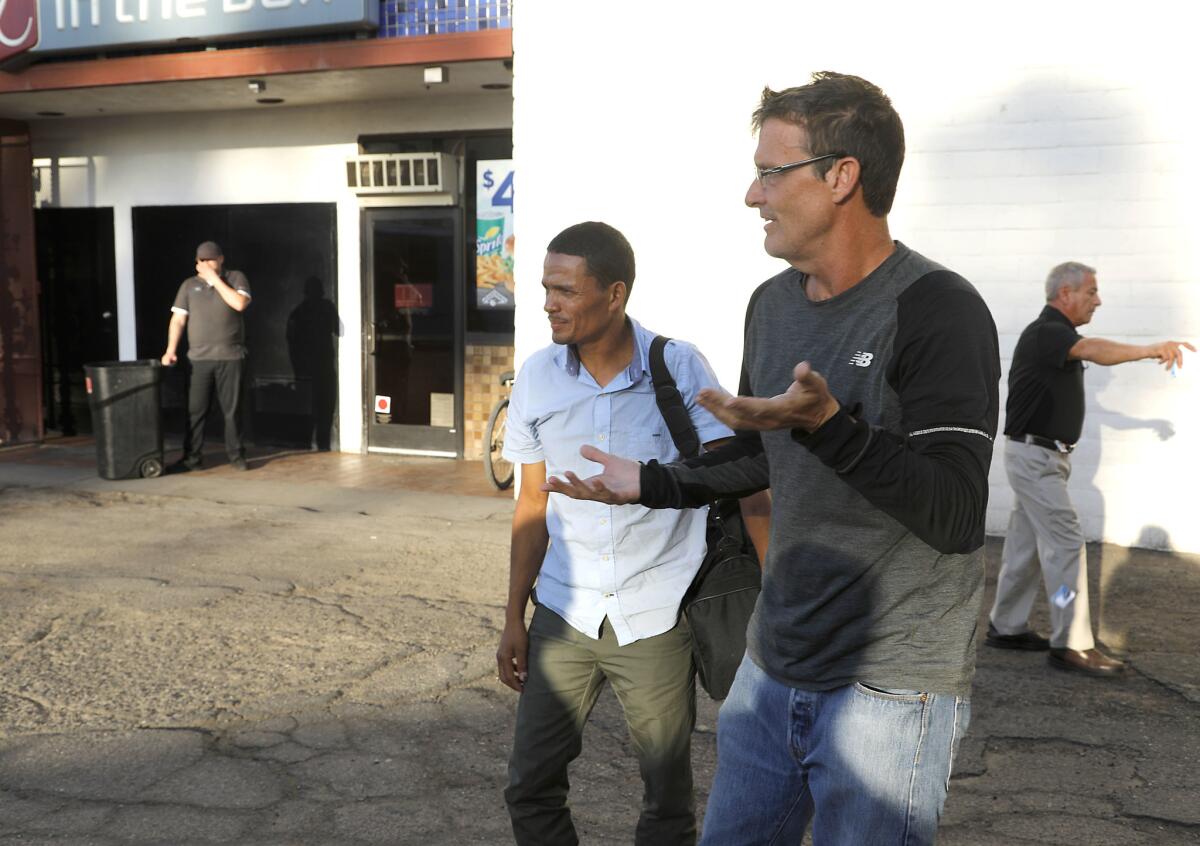After separation at the border months ago, some migrant families tearfully reunite

As parents were released Monday night from a detention facility and dropped off a block from the border in Calexico, they were greeted by advocates with Border Kindness.
- Share via
The Honduran cattle herder rubbed his hands nervously, perched on the edge of his seat in the baggage claim area of San Diego International Airport, scanning the crowd.
Suddenly, a curly-haired teenager caught his eye.
“That’s my son,” he said, his mouth widening into a grin as he launched himself toward an embrace that had been nearly a year in the making.
“Don’t cry,” he whispered as he hugged the boy, who had surpassed him in height since the two were apprehended last May by U.S. immigration agents. Redin, 39, and his 16-year-old son, also named Redin, were split up that same night. A month later, the father was deported back to Honduras and the boy was shuttled to a youth detention facility in Texas.
Last week, Redin was among the first of 17 Central American parents to be reunited with their children, the result of a humanitarian intervention by immigrant rights groups, propelled by a national class-action lawsuit filed by the American Civil Liberties Union on behalf of migrant parents separated from their families.
The lawsuit argues that the government’s actions violate the Constitution’s due process clause, federal law protecting asylum seekers, and the government’s own stated directive to keep families intact.

Since the Trump administration’s family separation policy began last spring, hundreds of parents were deported while their children remained in the United States. Government documents have shown that officials began separating families months before the policy was announced, which could result in potentially thousands more separations than previously known.
Though a U.S. District Court judge in San Diego blocked the policy last June and ordered the Trump administration to reunite all separated families, migrant advocates say that the administration has continued to quietly separate hundreds more families.
Last month, lawyers with the nonprofit Al Otro Lado (“On the Other Side”) helped nearly 30 parents from El Salvador, Honduras and Guatemala travel to the Mexicali border, across from Calexico, Calif., to demand entry to pursue asylum claims and reunite with their children. Redin and other parents who spoke with The Times did so on the condition that their last names not be published.
All the parents — who arrived at the border March 2 — previously had entered the U.S. and been detained, then deported, while their children were placed in U.S. shelters and foster homes or with stateside relatives. Twelve parents who came with minor children and other family members were processed and released within a week. But the 17 others who arrived alone were held in the detention facility, without explanation, until last week.
Al Otro Lado received close to $1 million from the nonprofit Together Rising, which established fundraising campaigns during the height of the separation crisis. After lawyers found the parents, they secured legal permission for them to enter Mexico; the parents then presented themselves to officials at the U.S. border. They all passed credible fear interviews, the first step toward establishing claims for asylum.
Erika Pinheiro, Al Otro Lado’s litigation and policy director, calls her strategy the “self-help option” for deported parents. She said it became necessary because the federal government wasn’t moving quickly enough.
“The U.S. government isn’t providing a clear path for every deported parent,” she said. “We can’t be waiting around.”

The first parents were released Monday night from the detention facility and dropped off a block from the border in Calexico, where advocates with Border Kindness greeted them.
Founder Kelly Overton started the organization after learning about the migrant caravans in late 2017 and realizing there were few resources for those in the Mexicali, Mexico, area. When Al Otro Lado put out a call for help last month, he jumped at the chance.
“If these were white kids taken from their parents and put somewhere, people would be outraged,” Overton said.
Many parents decided it was best for their children to stay in the U.S., fearing that they would be killed if they returned. But that decision isn’t without consequences. Children not placed in long-term foster care had to adapt to multiple shelters while being shuttled around the country.
“The kids are super-traumatized,” said Pinheiro. “Reunification is not the end of the story.”
Pinheiro and her team talked to nearly 100 parents deported without their children. Some didn’t have asylum claims, didn’t want to come back to the U.S., or said the first trip crippled them economically and they couldn’t afford the risk again.
Other parents, desperate to get their kids back, paid smugglers or otherwise somehow made their way back up through Mexico to attempt reunification on their own.
Additional parents have been referred to Al Otro Lado through other advocates. Pinheiro said she’s exploring how to help a second group of parents get to the U.S. legally to reclaim their children.
Among the thousands of separated families who haven’t been identified, many won’t be so lucky. For the 29 parents Al Otro Lado helped return, lawyers advocated to delay their children’s legal cases until they could find out whether the parents would be allowed back in to seek asylum.
But other children separated before the policy went into effect have deportation orders. Some, including 52-year-old Lorenza’s son, have already been removed from the country.
Her son, Jose, was 17 when they were separated by the Border Patrol. He spent a year in a youth facility, where he had a case manager who called Lorenza regularly after she was deported back to Guatemala. But when he turned 18, he was moved to a detention center for adults.
Jose had no money to call his mother. He didn’t know she’d been in contact with lawyers and was on her way back to the U.S. to reunite with him. With the other parents in Tijuana, days before they reached Mexicali, she got a call from Guatemala. It was Jose.
Pinheiro submitted a motion to reopen Jose’s case. Still, she said: “For a lot of parents, it’s going to be too late.”
For Lorenza and the parents released from Calexico, last week was just the beginning of a likely years-long asylum process. Next they’ll show up for appointments with Immigration and Customs Enforcement officers, apply for work permits and prepare for their first court hearings. Pinheiro will find new lawyers for those who will be living outside of Southern California and connect them with mental health services.
One is Nelvi, 36, who fled El Salvador with her then-14-year-old daughter, Ingris, after gang members attempted to rape the girl and threatened to kill them both.
They were detained by Border Patrol after entering Texas in April 2018. Two days later, an officer asked if Nelvi ever had been arrested in El Salvador. She told the officer that once, years ago, she’d been handcuffed briefly after a hair-pulling fight with her former husband’s sister, but she’d never been to jail or charged with a crime.
The officer cut off her explanation, and said they were taking her daughter because Nelvi was a criminal.
Two months later, getting desperate, Nelvi signed for her deportation, while Ingris stayed in a Texas youth detention facility. The weight of her suffering grew to be too much for Ingris, who tried twice to kill herself, the second time spending 10 days hospitalized.
“Mama, I need you more than ever,” she told Nelvi.
In San Diego, two days before their reunion, Nelvi showed a reporter the black chiffon dress and matching sequined wedge sandals that she’d brought for her daughter. Ingris missed her mother’s cooking and had requested a reunion meal of fried fish with bean-and-cheese pupusas.
“I’m going to buy the ingredients and make it for you,” a beaming Nelvi told her.
Redin, the cattle herder, said he never was offered the option of taking his son with him back to Honduras. But even if he had, he wouldn’t have wanted to: It was too dangerous.
His lawyers say that Redin escaped human trafficking in Honduras. Worried that his son also could be targeted, Redin borrowed money from his brother in the U.S. and paid a smuggler nearly $4,500 to get them into Texas. He didn’t want to leave his wife and five other children, but felt he had no choice.
Three hours after crossing the Rio Grande last May, the two were discovered by Border Patrol and taken to a nearby detention facility where they were placed in a hielera, or icebox — the nickname given by migrants to the frigid holding cells inside Customs and Border Protection facilities.
Redin began to sob when officials informed him that he was being deported while his son would stay in the U.S. Eventually he was brought some papers and told to sign. He can’t read and didn’t know what they were for but, feeling scared, did as he was told. He had agreed to be deported.
Eleven months later, when Redin arrived at the border last week, Border Kindness advocacy director Yolanda Brown drove him to Walmart to buy clothes and snacks. He stayed up late on his first night out of detention, listening to local Spanish radio on his phone.
Three days afterward, in the car leaving the airport en route to a new life with a California sponsor, Redin put his arm around his son.
“When they took away my son, I never lost hope,” he said. “I prayed to God that someday I’d be with my son again. One night I dreamed that I was hugging him.”
Finally, he was.
Twitter: @andreamcastillo
More to Read
Sign up for Essential California
The most important California stories and recommendations in your inbox every morning.
You may occasionally receive promotional content from the Los Angeles Times.











